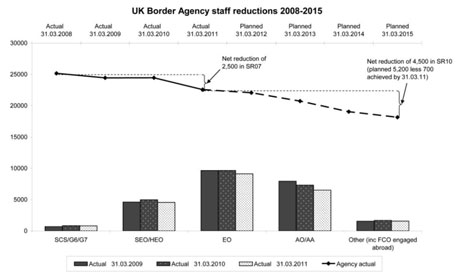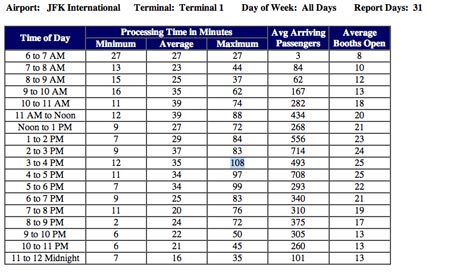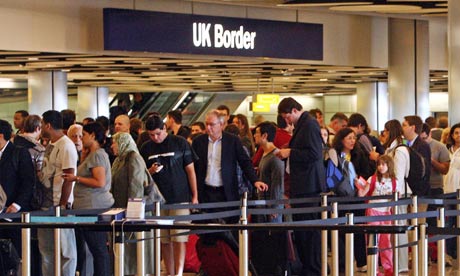The government yesterday acknowledged that passport control waiting times are in some cases too slow, blaming the recent bad weather for disruption at Heathrow. But the unions and Labour say that cuts to the UKBA is also contributing to the problem. What are the root causes of border delays?
I've had a brief exchange with our home affairs editor Alan Travis, who reported on the row this morning here. He says that cuts are a big part of the story of delays at airports, but that other factors that need to be considered include: rising passenger numbers, Theresa May's scrapping of the selective "risk-based" approach to checking passports and failures of the new technology in iris fast track and e-gates.
I'm going to look at the question about the impact of the cuts and try to gauge the scale of the impact of the reduction in customs officials. Do get in touch if you have any evidence that might help on this. We're also interested in hearing from people who have experienced particularly long waits at passport control in recent weeks.
Analysis
First, I thought I'd get hold of the data on waiting times to establish whether there really is a problem. That's when I hit my first brick wall. UKBA produces data, specifically on the rate at which they have missed their own targets of EU passengers waiting no longer than 25 minutes and international passengers waiting no more than 45 minutes. It distributes this to its stakeholders – the airliners and airports – but does not publish them. So we don't have a timeline of waiting times with which to even say that the problem has got markedly worse in recent weeks.
The evidence that it has comes from union officials and passenger reports. The immigration minister Damian Green, who has presumably seen the fuller UKBA data, has now acknowledged that there are unacceptable waits occurring particularly at Heathrow.
On staffing numbers I've asked the UKBA for stats on the number of staff they employ going back two years and specifically for Heathrow, where the major problems are occurring. But on twitter @DocRichard pointed me towards UKBA's annual accounts for 2010-11 which detail the scale of the reduction in border agency staff for the entire comprehensive spending review going up to 2015. This is summarised in this table:
 UKBA staff reductions March 2011
UKBA staff reductions March 2011
Those accounts state:
The average number of full-time equivalent (FTE) active staff we paid for either directly or indirectly during 2010-11 was 23,426 (compared with 24,474 in 2009-10) The size of the agency's workforce reduced by around 1,900 (8 per cent) during 2010-11. We plan to achieve further efficiencies, resulting in further workforce reductions, in the period between April 2011 and March 2015.
This doesn't cover Heathrow specifically so I will continue to chase separate figures on that.
I asked Heathrow to provide passenger numbers to assess the part rising visitors to the UK would have on the ebb and flow at the borders. They came back with these figures showing an increasing pattern over the past couple of years.
It's clear that passenger numbers have increased in the period that staff at the UKBA have decreased. But we don't know how the agency's staff are distributed – particularly the number working at Heathrow. I'm going to try and get some better figures from the UKBA and BAA and report back.
I've just had a discussion with editors on our newsdesk who are particularly keen that we get a sense of proportion in our reporting of this story. Are longer waiting times a necessary price for tighter border control? How long do people wait in airports in other countries?
My colleague on the datablog Simon Rogers pointed out that in the States they constantly publish border control waiting times for each terminal. You can see almost live data from New York's JFK airport here. As of 11am yesterday the longest period anyone was waiting was 25 minutes in Terminal 9.
US Customs and Border Protection publish average waiting times, per hour across a month, here for all their airports. Looking again at JFK the maximum waiting time at JFK airport's terminal 1 in March was 108 minutes, the highest hourly average was 39 minutes. The data also includes the number of passengers passing through and the number of booths that were open so people can readily assess whether they are properly staffed.
 JFK waiting times March 2012
JFK waiting times March 2012
As we've discussed above, there is no such data available for the UK. We'd be really interested to hear – particularly from frequent fliers – about their experiences in different countries. Do let us know below the line, on Twitter at @pollycurtis or email me at polly.curtis@guardian.co.uk.
Below the line @Prasino makes an interesting point about the impact that long queues at border control can have on a country's image, writing:
Entry has a major impact on a country's image. It demonstrates the country's attitude to visitors and to foreigners in general. A poor entry system indicates that they are not welcome, not to be trusted (a very important factor) and are not likely to have a good time. Yes people know it is the government but in a democratic country it shows who influences the goverment: le Pen, Wilders, Daily Mail etc. Entry through Shanghai sets a very good image of modern day China; Sao Paulo makes one wonder how on earth they will cope with the World Cup.
There is enough research in the nation branding world to demonstrate that a country's image and reputation depends on part to its openess to others. Long, expensive, queues for visas (and the Uks is often singled out as a problem) and then long queues at entry points show "we do not trust you" but of course we then expect to travel freely without visas and queues when we go there!
Can anyone point us towards this research from the "nation branding world"?
Simon Rogers from the Guardian's datablog has just sent over this:

I came across the work of Professor Susan Martonosi, a Harvey Mudd maths professor in California who has made it her mission to reduce airport security waiting lines. You can listen to her here.
She was brought in by San Francisco airport to see how maths could help shorten the queues. There she observed how security officers dynamically monitored each queues, shifting people and opening booths as they needed to. She has developed a mathematical model other airports can use to get their queues down, by replicating how the SFO officers worked. The US target time is 10 minutes waiting - way below our 45 target.
The Guardian's home affairs editor Alan Travis has written a thorough analysis of the problems at UKBA concluding that a large part of the issue is the home secretary's order last year to drop the "risk-based" approach to checks. He writes:
Alan Travis. Photograph: Linda Nylind
As the former Labour communications chief Alastair Campbell tweeted: "If this is what Heathrow T5 border queue is like on an average Thursday Olympic athletes should think about coming soon #sortitout."
"Sorting it out" is the one of several things that the home secretary, Theresa May, of course, would like to do. But when it comes to the issue of passport checks she is somewhere between a rock and a hard place.
"It all goes back to Brodie Clark [the former head of the UK Border Force ousted amid claims that he relaxed border checks without ministerial authority] and the insistence of having full passport checks which everyone has to go through," said a Whitehall source.
"This is unsustainable. You simply can't do it. Once you say that everybody must have full passport checks, as the home secretary has done, then it becomes very difficult politically to row back from that."
The home secretary's political attachment to full 100% passport checks stems directly from her desire to burnish her reputation as tough on immigration following the forced departure of the last UK Border Force head, Clark, and his policy that the queues could only be managed by a "risk-based approach" to passport checks. The problem is that the system cannot cope – especially when Border Agency staffing numbers have to be cut by 18% or 5,000 fewer staff by 2015.






